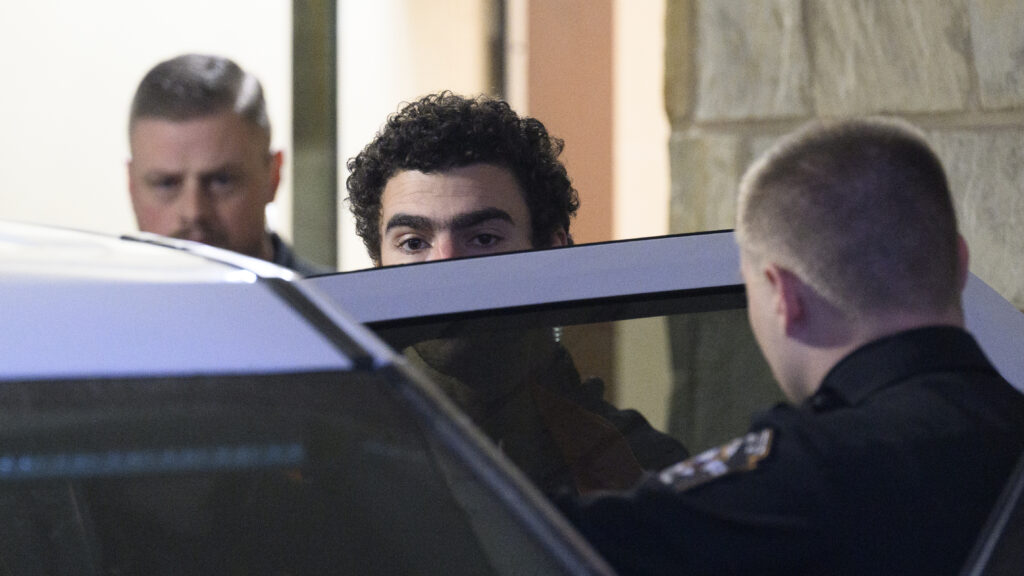The suspect in the killing of UnitedHealthcare’s CEO appears to cite two prominent critics of the U.S. health care system in his handwritten manifesto — journalist Elisabeth Rosenthal and filmmaker Michael Moore — although neither of their works focused on the insurance company.
Police found the document on 26-year-old Luigi Mangione when they arrested him on Monday at a McDonald’s in Pennsylvania. Mangione, who has been charged with second-degree murder, directly mentions UnitedHealth Group, the parent company of UnitedHealthcare, just once — pointing out that its growth has not improved the country’s life expectancy. His note also does not single out the health insurance industry explicitly and instead criticizes how “expensive” the broader system has become.
advertisement
“Obviously the problem is more complex, but I do not have space, and frankly I do not pretend to be the most qualified person to lay out the full argument,” the suspect, Luigi Mangione, wrote in the document, which was posted online in its entirety by the journalist Ken Klippenstein. “But many have illuminated the corruption and greed (e.g.: Rosenthal, Moore), decades ago and the problems simply remain.”
Rosenthal is a senior contributing editor at KFF Health News and its former editor-in-chief. Moore has produced films including the 2007 documentary “Sicko,” which criticized the U.S. health care system. He also filmed “Bowling for Columbine,” which examined the country’s gun violence problem.
STAT requested a copy of the manifesto from the Manhattan District Attorney’s office but did not receive a response. Excerpts of the document posted by other news outlets match the text posted by Klippenstein. The New York Times also reported that police have Mangione’s notebook that has “more detailed plans for the shooting.”
advertisement
Rosenthal is the author of “An American Sickness: How Healthcare Became Big Business and How You Can Take It Back,” a best-selling book published in 2017 that chronicles how health care companies have exploited the trust of sick Americans for profit. She was unaware of the manifesto’s contents until STAT inquired Tuesday.
“I don’t condone murder for any reason. This is a terrible, tragic murder, and it shouldn’t have happened,” Rosenthal said in an interview. “That being said, I’ve basically spent the last decade of my life hearing from and reporting on patients who are deeply frustrated and angry with a health system that doesn’t serve their needs.”
She pointed to the “Bill of the Month” feature from KFF Health News and NPR that highlights people’s medical bills and how they reflect broader problems with health care prices and coverage gaps. Rosenthal said the project has received nearly 10,000 submissions over its six-plus years.
“The frustration runs deep, and it’s getting deeper,” Rosenthal said. “We’re talking about why people feel poor, and they look at gas prices and eggs. The reason they feel poorer is because of how much they’re paying for their health insurance or how much they’re paying hospitals and providers if they don’t have health insurance. It’s a sad state of affairs.”
Rosenthal’s book details the history and modern business practices within each major sector of the health care industry — insurance, hospitals, physicians, pharmaceuticals, medical devices, tests, billing and coding, and research. The book mentions UnitedHealthcare only once, noting that the company “paid laboratories between $17 and $618 for vitamin D tests” in 2014.
Health insurance, she writes, “is in some ways the original sin that catalyzed the evolution of today’s medical-industrial complex,” as coverage evolved from mechanisms to help people with lost incomes when they were hospitalized to the comprehensive plans we have today. As care and technology advanced, Rosenthal wrote how “the money chase was on” among all actors in the system, and that “no one was protecting the patients.”
advertisement
“When I wrote that book, that was my first and only book. I kind of had an illusion that I would write this, people would see the light, and everything would get fixed,” Rosenthal said. “And here we are, eight years later, and it’s mostly just gotten worse.”
Moore did not respond to an interview request, but he weighed in on the shooting in a Dec. 6 Substack post, in which he said America’s health insurance industry makes money by denying people care. The post directs readers to a clip from “Sicko,” which Moore said underscores his points.
“It’s one of our most awful and ugly truths — truths that we don’t really want the rest of the world to see,” Moore wrote. “Because no other industrialized country on Earth so willingly and heartlessly lets a few large corporations literally decide who shall live and who shall die — a decision that is based solely on profit motive.”
“Sicko” only makes passing references to UnitedHealthcare in lists of insurer profits and CEO salaries. It features heartbreaking interviews with the families of people, including a toddler, who died because insurers denied coverage for tests and procedures, but none of them had UnitedHealthcare insurance. Much of the documentary focuses on Americans traveling internationally for care and insurers denying coverage to patients because of pre-existing conditions, a practice that’s now prohibited because of the Affordable Care Act.
“Sicko” focuses more attention on another insurer, Humana, spotlighting one of its former medical reviewers, Linda Peeno. Peeno, a physician, says she was directed to deny at least 10% of requests for coverage, with bonuses for meeting the goal.
Mangione faces charges in both Pennsylvania and New York tied to CEO Brian Thompson’s death. He appeared in court Tuesday and was denied bail. New York prosecutors have attempted to bring Mangione to New York, but his attorney said he would fight the extradition, according to Gothamist.

